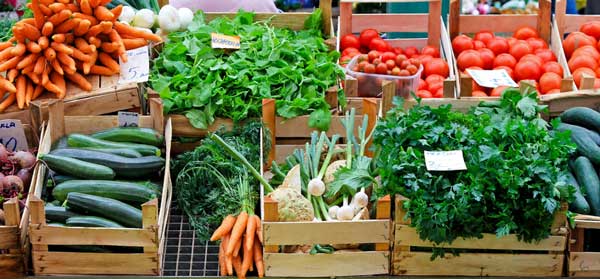There are as many health experts who’ll tell you to eat organic as there are who’ll tell you not to bother. So, is it worth the splurge?
Before you can decide whether the price tag that accompanies the ‘organic’ label is a worthwhile spend for you, you need to understand what ‘organic’ means.
‘Organic’, ‘certified organic’ and ‘biodynamic’ are terms that mean different things in different regions of the world. In Australia, these labels refer to the following:
Organic
Foods labelled as ‘organic’ in Australia are grown and/or processed in ways that ensure no synthetic chemicals, fertilisers, growth hormones, pesticides, growth regulators or herbicides are used. Any plants or plant materials used to make the product cannot be genetically modified, and the environment and animal welfare need to be respected. It should be noted that ‘organic’ food is technically allowed to contain up to five per cent non-organic ingredients.
Biodynamic
For a food to be labelled ‘biodynamic’, it must meet even more stringent regulations than organic foods. Biodynamic farmers use only natural products in their farming, and rely on following the natural rhythms of the seasons and the climate to produce their food. Biodynamic farming has a strong focus on following the natural rhythms of nature, and working holistically.
Certified organic/biodynamic
If a food is ‘certified organic’ or ‘certified biodynamic’, it means that one of the seven Accredited Organic Certifiers in Australia has checked and approved that the farmer meets the above standards for their organic or biodynamic produce. If you are going to buy organic produce, make sure you look for some sort of certification.
So why does organic food cost more? The answer is simple: it costs farmers a lot more to produce. For example, it takes 50 per cent longer to raise a chicken without the use of growth hormones, and the organic chicken feed it eats over that extended growth period costs more than non-organic feed. Growing fruits and vegetables without pesticides comes with higher risks, and growing without chemical fertilisers takes a lot longer. The higher costs of producing organic food are simply unavoidable. But is it really worth it?
Officially the jury is still out, but more evidence is pointing towards pesticides and growth hormones as the culprits of various diseases. If you can afford it, yes, it likely is worth going the organic route. You may also find that, although organic fruits and vegetables don’t look as big or colourful or perfect as the non-organic kind, they are packed full of flavour in a way that produce grown unnaturally and quickly just isn’t.
If you are considering going organic, but aren’t ready to fully commit, here are some of the best items to consider splashing some extra cash on for the organic alternative:
Milk
Cows treated with hormones pass those hormones through to their milk. Elevated levels of these hormones in humans has been linked to higher risk of cancer.
Soft-skinned fruits
Soft-skinned fruits, especially berries, readily absorb and store any pesticides sprayed on them during the growing process. By contrast, fruits you normally peel, such as bananas and oranges, have been shown to contain lower concentrations of chemical contaminants. The exception to this is melons of all kinds – even though you don’t normally eat the skin, they absorb and store chemicals in their edible centres.
Soft-skinned vegetables
Similar to fruits, vegetables such as tomatoes (yes, technically it’s a fruit), zucchinis, celery etc. will absorb and store pesticides and other chemicals, ready for you to consume.
Meat
Not only does organic meat need to be fed organic feeds, it also can’t be given preventative antibiotics or growth hormones, making non-organic meat a triple-threat.
If you are looking to switch to organic, it is worth researching which foods are not worth the spurge, as many simply won’t contain any extra chemicals. And remember: look for the certified organic label. If it’s certified, you’re guaranteed to be getting you money’s worth. If it’s not, you could be wasting your money.
What do you think? Is organic worth the extra money? Or is it just another way for companies to hike prices on their products?
Related articles:
Ways you’re wasting money on food
Best foods for healthy joints
Five worst breakfast foods

